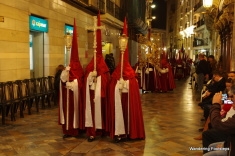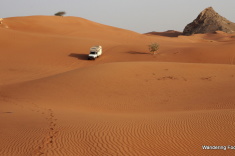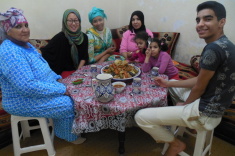As soon as we crossed the border from Tanzania into Burundi, the tar road halted. In its place was one of the worst dirt roads we’d ever driven upon. It was a fitting symbol for the week that was to come.
You see, most of the time when we cross the border into a new country, the differences aren’t immediately noticeable. It takes a while for us to feel that we have entered a new land. In Burundi, it was immediately clear that we had entered into a country like no other.
Admittedly, most of the things which made Burundi unique were subtle – villagers wearing tinted spectacles, women sporting Will Smith’s Fresh Prince of Bel-Air haircut and wearing flowery wraps rather than the usual African-patterned ones, or the peculiar way that people greet one another by wrapping their right arm around the other person’s left shoulder.
But there were a few larger differences, too. The fact that this was the first French-speaking African nation I’d visited since Senegal in 2005 (though to say Burundian people speak French is a tad of an overstatement). The fact that people drove on the right side of the road. The fact that the entirety of Bujumbura was jogging (and a few roller-blading, even) along the side of the highway on the Saturday morning of our city departure. Or the fact that there were more people packed into the villages and onto the roadsides than either of us had ever seen before.
.jpg) |
| Bruno was really – I mean really – happy to see French signs everywhere in Burundi. |
.jpg) |
| That first Burundian dirt road after the border. And the first overcrowded Burundian village. |
.jpg) |
| The entire city of Bujumbura came out to jog on Saturday morning. I have a few funny shots of people stretching along the highway, too. |
It was the people that put Bruno off. “They’re like a colony of ants!” he remarked, as he swerved the Toyota to avoid a family that had darted into the middle of the highway.
I couldn’t blame him. Between the potholed, narrow roads weaving through the hills, the cars doubling him at breakneck speeds, and the hoards of people pressing against the edges of the road, driving in Burundi seemed massively stressful.
For me, though, it was a feast for the eyes. As the passenger, I was free to look the equatorial flora, the hilltop panoramas, Lake Tanganyika sparkling in the sun, the mountains of the Congo hazy beyond. Because of the sheer number of locals, there was always something to look at. My senses hadn’t been this alive since India.
 |
| Masses along the Burundian roadside made driving a challenge for Bruno. |
 |
| Unique floral fabrics, beautiful pottery, equatorial foliage – Burundi was a true feast for the senses. |
 |
| Snapshots of tropical flora along the coast of Lake Tanganyika. |
I was on an overstimulation high by the time we reached Burundi’s capital, Bujumbura. It continued throughout our three days there. This capital pleased me. Its wide, clean boulevards and cobbled side streets, its manageable size, its reasonable amount of traffic and people, its beautiful beach – on the northern tip of Lake Tanganyika – mere kilometers away from the center of town. I could almost believe that I was in Europe, which was a welcome feeling after so many months in the depths of deepest, darkest Africa.
The Belgian influence was still very much present in Bujumbura, if not elsewhere in the country. Here, I could eat quiche, drink amber ale, buy a block of delicious local cheese. I could walk into a patisserie and choose between a baguette, a load of whole wheat bread, even a pain au chocolat! Poor Bruno had to follow me around for two days while I devoured the entirety of the city and restocked our food supply with gourmet delicacies.
Our last afternoon, to compensate for our massively expat-ish behavior, we ate at a local (meaning ‘African’) patisserie. It was filled mostly with men, in groups or alone, dunking various bread products in cups of hot tea or coffee or gigantic glasses of milk. We did the same, in a sort of alternate universe where Europe and Africa coexist in a strange but tasty mélange.
 |
| Bujumbura, Burundi’s capital, was teeming with patisseries. |
 |
| A sneak shot of Bujumbura men dipping their bread products into massive glasses of milk or hot tea. |
 |
| An empty cobblestone street in Bujumbura. Can you believe this is an African capital city? |
But Burundi was far from an easy place to travel. So soon after its lengthy civil war, tourist infrastructure is almost non-existent. It was especially difficult for us, as though there are a smattering of hotels, there is not a single campsite in the entire country. Each time we arrived to a new place, it was a struggle to find a place to sleep. Sometimes we parked at a restaurant or bar (as was the case with our first two campsites along Lake Tanganyika). Once we parked at the headquarters of a national park. Twice we were forced to rent cheap rooms in guest houses and park the car nearby.
The best illustration of Burundi’s readiness for tourists is when we arrived at le parc national de la Kibira, a forest reserve in the northwest of the tiny country. There was no ranger at the headquarters, but an old farmer and a young man who spoke a bit of French soon appeared.
“We’re looking for a campsite,” we spoke in slow, clear French. I pointed to a sign on the wall which showed a picture of a tent and had the word “campsite” written in three languages, including his own, Kirundi.
 |
| The fact that there was a sign for a campsite meant that, surely, there was a campsite. Right? Wrong. |
“Yes, yes, it’s 2km that way. I will accompany you,” the young man replied confidently.
Since we didn’t have space for two extra people in our vehicle, we walked. Past the processing plant of a tea plantation. Past the wood factory that feeds it. Up a dirt road, into a small forest, and then up a footpath. Up a big hill, through the tea fields. For kilometers upon kilometers.
“This is more than 2km,” I tried to say to the man. By this point I was sweaty and thirsty and cursing myself that I hadn’t brought my camera for “our little stroll”. He smiled and nodded, but I don’t think he got the message.
The abruptly, we stopped. The old man was now in the lead. We were in the middle of a tea field on a hill overlooking more tea. The forest was still up ahead.
“Here is the campsite,” translated the young man.
We looked into the bush, and spotted some sort of brick column. Behind was possibly a veranda and maybe a small room. I think the roof was caved in, but I’m not sure because all of it was covered in thick bush. There was, in any case, no road for us to bring our car, no place for us to park, and no water, toilet, or shower.
 |
| Re-enacting our hike through the tea plantations to the “campsite,” near the forest over yonder (top right). |
 |
| The campsite we were brought to after a 4km jaunt through the hilly tea plantations. |
 |
| Admittedly tea is beautiful, even though it’s sad to see it juxtaposed next to virgin forest. |
Eventually we understood that this had been the campsite. Maybe twenty years ago, before the war. Perhaps these two locals thought we wanted to visit a historical sight? We will never really know for sure. All we know is that we were walked a total of 8km roundtrip, through Teza tea plantation to the edge of the Kibira Forest to see a campsite that no longer existed. And we still didn’t have a place to sleep for the night.
Finally, the ranger showed up and allowed us to park our car at his headquarters for the night. That meant we could hike in the forest! Though the plantation was pretty – the hills of fluorescent tea looked like a gathering of tortoises showing off their carapaces – it was sad to walk through. Tiny pockets of virgin forest stood in the valleys between the hills of tea, reminding us of what had been here before man had taken over.
This was, in fact, the case throughout Burundi. It seemed as if every inch of land had been carved up into square plots for small-scale agriculture. Along the coast, palm trees stood in perfect rows, their multi-purpose orange oil showing up in rusty barrels and plastic water bottles in markets across the country. Cassava, the poor-man’s plant, grew around tin-roof huts built by the same international aid agencies that were trying to convince Burundians to grow healthier maize, instead. From the top of the hill in Kibira National Park, the Burundian landscape looked more like an earthy patchwork quilt than a forest.
 |
| Wandering through the parc national de la Kibira |
 |
| Palm tree plantations along the coast of Lake Tanganyika. You can use this oil for cooking, for lighting a room, and for cleaning your body |
Sleeping wasn’t our only challenge in Burundi, either. Remember how I mentioned all the people in the villages and on the roads? Wherever we drove, we had people screaming “mzungu!” at us. We get called this most-endearing [insert sarcastic tone] KiSwahili term for “foreigner” throughout Africa, but this was on a whole other level. It was screaming and running bordering on crazy. It was people attaching themselves to our vehicle as we drove past. And it wasn’t just children.
If we got out of the vehicle, most people seemed to lose their nerve, as though we’d stepped onto equal footing. But the more time we spent in Burundi, and the further we got from Bujumbura, the more we realized that we hadn’t stepped down to their level at all. They were just too stunned to react. Wherever we walked, it was as though we were in a scene of a movie on pause. Everyone stopped doing what they were doing and simply stared. Only we moved through the scene, trying desperately to feign indifference.
But it was hard. And eventually, once we had spent a few nights in a row being stared for hours at our “campsites,” it got the better of us. It was time to leave Burundi.
 |
| So many villages, so many people. |
 |
| Kids staring and shouting “mzungu!” |
Burundi will remain forevermore a paradox for me. As a nameless mass, the Burundian people were incredibly challenging, with their begging, invasive staring, and fanatic shouting. But as individuals – restaurant workers, nuns, students, and park rangers – they were polite, kind, soft-tempered, and wonderful to interact with. The country had so much cultural potential, so much to engage the traveler, so much to stimulate the senses, yet it was nearly impossible to travel through.
I’m glad we went to Burundi. It was a challenging week, but it was one-of-a-kind. Will I ever go back? I don’t think so. A week in Burundi is enough.
 |
| Bruno and I celebrated our two-year anniversary on our last evening in Burundi. Has it ONLY been two years? Feels like a lifetime already. |


